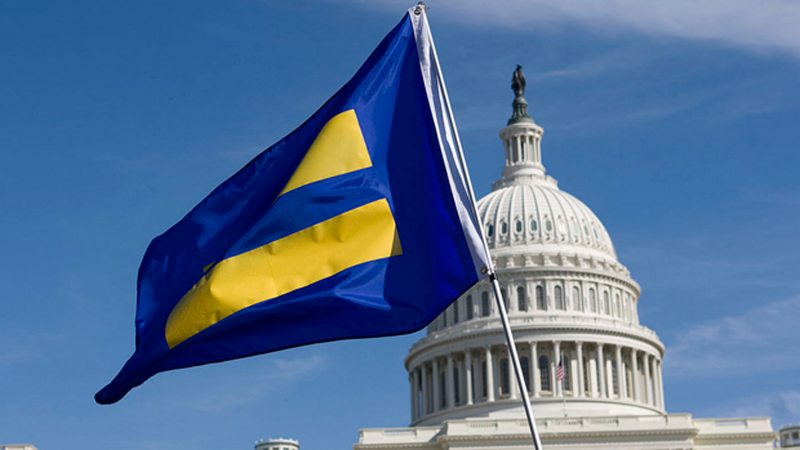The Human Rights Campaign (HRC)—the nation’s largest LGBTQ equality organization—is advocating for our next president to enact specific policy changes spanning the federal government that would fortify protections and increase representation for LGBTQ Americans.
The Washington Post reports that HRC “is preparing to release a report after the election urging more than 70 specific policy changes that would ban LGBT discrimination in federal programs and show a government-wide commitment to diversity in gender identification and sexual orientation.”
In an 18-page executive summary obtained by The Post, HRC highlights the Obama administration’s many accomplishments that helped pave a still-tenuous path toward full equality for LGBT people under the umbrella of the federal government. The organization maintains, however, that the next administration still faces myriad issues that it must tackle in the name of our community.
“[I]n the wake of years of tremendous federal progress, the LGBTQ community finds itself at yet another crossroads. There is still so much left undone,” HRC wrote.
The Human Rights Campaign endorsed Hillary Clinton for president on Jan. 19, and given her opponent’s record of anti-LGBTQ statements and his campaign promises to derail already-enacted progress for the LGBTQ community, it may be fair to infer that HRC’s recommended policy changes are primarily directed at Secretary Clinton (should she win the election on Nov. 8).
In other words, it seems highly unlikely that Donald Trump would give HRC’s executive summary any priority in his administration’s goals—or that he would even read it. Conversely, Secretary Clinton has made LGBTQ equality a cornerstone of her campaign, including her assurance that she would try to appoint Supreme Court justices who back the high court’s 2015 decision that finally allowed gay men and lesbians to legally exercise their right to marry.
Regarding that issue, Donald Trump has bloviated numerous times on his staunch support of so-called “traditional marriage,” and in a Fox News interview, stated, “I don’t like the way [the Supreme Court justices] ruled […] If I’m elected, I would be very strong in putting certain judges on the bench that I think maybe could change things.”
What, you say? “Change things?” If Trump’s elected and you’re married to a partner of the same sex, who knows what will become of your (for now) very-legal nuptials? If you plan to wed in the future, does this basically mean, “Don’t hold your breath”? Important issues to ponder when you hit the voting booth tomorrow.
After the election, HRC will release their report, which, according to that organization, calls for “quick passage of The Equality Act, which establishes explicit, permanent protections against discrimination based on an individual’s sexual orientation or gender identity in matters of employment, housing, access to public places, federal funding, credit, education and jury service.”
HRC will also urge the next president to appoint the first openly LGBTQ cabinet secretary and to add more LGBTQ individuals to the ranks of judges, executive officials and ambassadors.
“It is essential that federal judiciary and executive offices reflect the diversity of the country,” the group stated.
The Post writes, “HRC also urged the Federal Trade Commission under the next administration to prohibit the practice of [so-called] ‘conversion therapy’ as fraudulent and take action against individuals and organizations that offer it. Conversion therapy is the scientifically discredited practice of treating individuals with the goal of ending their attraction to people of the same sex, and is widely criticized by gay rights advocates.”
“In January, Clinton promised to end the practice of ‘conversion therapy’ on minors if elected, support transgender people serving in the military and back legislation to include discrimination against LGBT people in the Civil Rights Act,” The Post concludes.


What Do You Think?